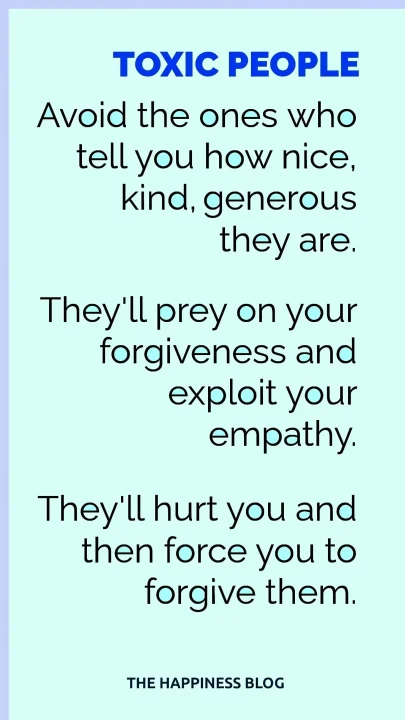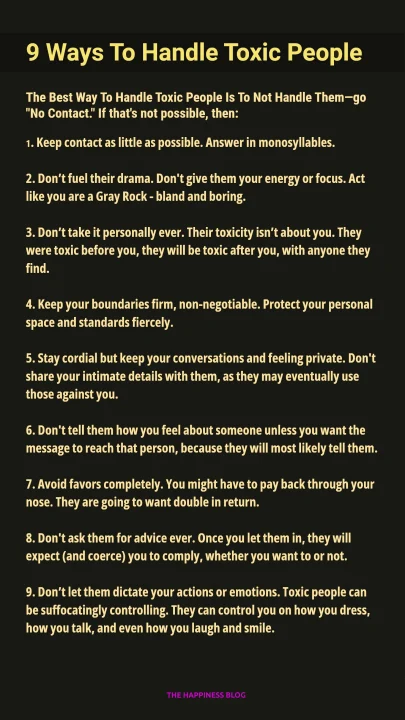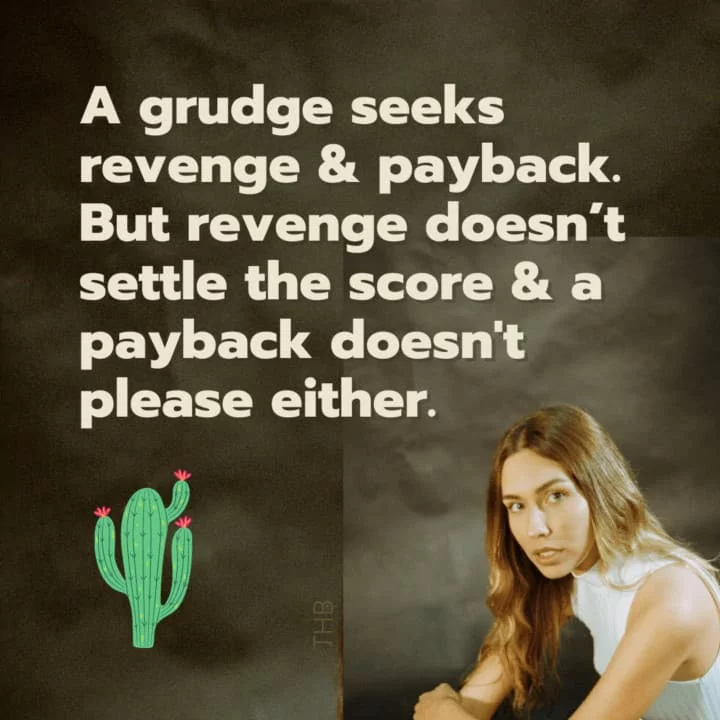Today's Saturday • 8 mins read
You don’t choose toxic people consciously; they choose you.
They wear a mask when they become your friends. You realize it later when these friendships become one-sided, draining, and even abusive.
Then, sometimes, your good friends turn toxic over time. After spending time with them, you always walk away feeling awful.
They are hard to unfriend. You have good memories with them. You still feel sympathy for their vulnerabilities.
But you need to cut them off as a favor to yourself. So, how do you do it, without being rude?
Three take-homes:
- Stop being a “good friend” to a toxic friend, but keep your dignity.
- Don’t let a particular person have wicked fun at your expense.
- Don’t let a bad friend ruin your good day.
Some signs of toxic friends: they take you for granted, criticize your choices, minimize your achievements, exploit your kindness, and force you to forgive their sins.

How To Cut Off Toxic Friends Without Being Rude
Cut off that toxic friend, even if you’ve known them for a long time. Just keep in mind, when you decide to do so, you don’t have to be disagreeable to disagree.
How to cut off toxic friends:
1. Slowly drift apart from the friendship.
Drifting apart is the most sensible and practicable way to cut off a toxic friend.
You meet them less and less, respond infrequently to their messages, and stop taking or returning their calls.
When they ask you why you don’t meet or talk to them as much as before, and you tell them you got busy.
They too slowly lose interest in you and stop trying to connect with you as frequently.
Then you stop thinking about them. Other people and things replace their space in your life.
Thus, you irreversibly move away from the toxic relationship without making the cut too obvious.
2. Just end the unhealthy friendship.
When a friend repeatedly violates your boundaries, like using peer pressure to make you do things you don’t want to do, end the friendship.
You can’t change them, no matter how much you explain your distaste and regret. They will do the same things.
Break all ties with these friends.
Just tell them it’s over. No discussion; just inform them that you’re ending the friendship.
- Tell them that you’re ending the friendship.
- You do not need to explain your decision.
- Return their stuff — money, gifts, loans, etc.
- Avoid arguments. Focus on ‘I’ statements.
- Tell your other friends about the breakup.
- Be direct, stay calm, and show respect.
Choose your peace over being nice.

3. Have a two-way talk before a clean break.
Having a breakup/closure discussion is a responsible way to break off from a long-time friend who has been toxic for a while.
This informed, clean breakup has three acts – preparation, execution, and maintenance.
a. Preparation
- Practice (before mirror) declaring your decision to end the relationship.
- Write down a thank-you card or letter for their friendship.
- Note down a few things you would want to tell them.
- Pack everything you want to return to them.
b. Execution
- Go with the idea that this is the last time you’ll talk as friends, and you don’t want either of you to carry back bitterness.
- Ask them for their availability and time. Invite them to a safe, less busy place for “an important discussion.”
- Take along a friend or family member to stay in the background if you think they might react unusually.
- Tell them about your decision to end the relationship. Explain your decision and position. Listen to what they have to say in response. Use your notes to discuss what you want to say.
- If they choose to walk off abruptly, respect their choice.
- Hand them over what you wish to return, asking them if they think you owe them anything else.
- Thank them, wish them well, and give them the thank-you card/letter.
c. Maintenance
- Block them from your contact list, social media, messenger apps, and emails.
- Get busy with other things, like a new hobby or a passion project.
- Avoid places that bring them to your memory.
- Discard anything that reminds you of them.
- Release them from your thoughts.
- Join a group or charity.
- Do things alone.
Toxic friends are not a good option, even if they are your last option for friendship.
How To Hold Up After Ending A Toxic Friendship
Even after you end the relationship, toxic friends can take a toll on your physical and mental well-being. Here’s how to hold up after your breakup:
1. Prepare to cope with the emotional fallout.
The end of a long-time friendship can bring in many painful emotions. Sadness, guilt, regret, or anger can all be there.
The right way to cope is to process those emotions. Let these difficult feelings pass over you, not deny or shut down them.
Some vital things to do to handle the emotional aftermath:
- Don’t blame yourself or feel guilty for ending the friendship.
- Allow yourself to grieve the loss of your friendship.
- Take care of yourself physically and emotionally.
- Focus on the positive aspects of your life.
- Talk to a trusted friend or family member.
- Write a self-compassion letter.
My advice: Prepare for the grief via the Stoic practice of premeditatio malorum. See a clinical psychologist if you find it hard cope on your own.
2. Don’t hold grudges. Don’t seek revenge.
- Grudge is a persistent feeling of ill-will from a past insult or injury.
- Revenge is a desire to repay an injury or insult.
Your toxic friend may have done many things to hurt you. But you cut them out of your life.
Why harbor grudge and revenge, and let them live in your head without paying rent?
Holding a grudge against someone lets them hurt you more.
Research shows holding a grudge can harm physical and mental health, consume your energy, limit your future success, and even lead to depression and anxiety.
Holding a grudge makes you hurt longer and heal slower.
A desire for revenge is a waste of time and energy. One revengeful act can turn into a spiral of revenge.
A payback does not please either party:
- Offender may think they paid too much (over-compensation), while
- Victim may think they did not receive enough (under-compensation).

Your “best revenge” against your toxic friend is what we discuss next – Forgiveness.
3. Forgive the wrongs of your toxic friend.
The first thing about forgiveness is that it is about you, not them.
When you forgive someone, you unload their weight from your mind.
Forgiving means getting rid of the harmful person from your mind, so they can’t hurt you anymore.
Forgiveness is an act of self-compassion that releases you from the negativity loop, allowing you to move on in your life with peace.
Forgiving means deciding to stop carrying the burden of the toxic past. It is letting go of your desire to harm them back, which especially flares up when you’re angry or drunk.
Forgiveness means you no longer care about them.
So, forgive and protect your mental peace.
How To Set Boundaries With Friends
- First, every relationship needs some boundaries.
- Second, toxic friends need stricter enforcement of your boundaries.
Boundaries are about what you will do (not what they should do). Tell them what actions you will take, using “I” statements.
Say, they’re doing something harmful in your presence, tell them you will leave if they continue.
You: “I will leave if you use another word of insult.”
They: “So, you feel insulted by my words?”
You: “Yes, and I won’t tolerate any.”
Some tips for setting boundaries:
- Be direct and honest about your needs.
- Don’t be afraid to say ‘No’ to their requests.
- Don’t feel guilty about setting strict boundaries.
- Stick to your boundaries, even if they make you feel guilty.
They might change themselves. But it’s more likely that they will return to their toxic and unkind selves.
*Did you know teens and young adults who smoke are more likely to have smoker friends — which, in turn, makes them want to smoke more? (Source: Peer pressure to smoke: the meaning depends on the method, Michell & West, 1996.)
Final Words
Why is it tough to cut off toxic friends? Because you:
- Hope they will change for the better with time.
- Believe they will be of some help to you in the future.
- Think they don’t harm you so much that you have to break off.
None of that is a dependable truth. They won’t change. Your doing good things for them doesn’t guarantee they would return the favor. They are harming you in many invisible ways.
Advice: When you end a relationship, try being happy-busy (optimal busyness).
√ Also Read: 10 Steps To Forgive Someone Who Keeps Hurting
√ Please share it with someone if you found this helpful.
» You deserve happiness! Choosing therapy could be your best decision.
...
• Disclosure: Buying via our links earns us a small commission.